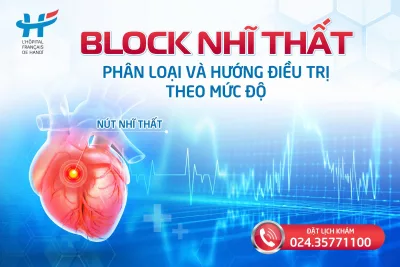Atrioventricular (AV) block is a type of heart conduction disorder where electrical impulses from the atria to the ventricles are partially or completely interrupted due to abnormalities in the AV node, His bundle, or the His-Purkinje system. AV block is classified into 3 degrees: First-degree AV block: The mildest form, where all atrial impulses reach …
Atrioventricular (AV) block is a type of heart conduction disorder where electrical impulses from the atria to the ventricles are partially or completely interrupted due to abnormalities in the AV node, His bundle, or the His-Purkinje system.
AV block is classified into 3 degrees:
First-degree AV block: The mildest form, where all atrial impulses reach the ventricles but with a prolonged conduction time. Often asymptomatic and found in 7.8% of healthy individuals, primarily African American men.
Second-degree AV block: Some atrial impulses fail to conduct to the ventricles, causing irregular heartbeats. There are two main types:
- Mobitz I (Wenckebach): More common (1–2% of healthy young individuals), often drug-induced or related to increased vagal tone. Usually transient with a good prognosis.
- Mobitz II: Less common but more serious, with a higher risk of progressing to complete block. Usually associated with structural conduction system damage.
Third-degree AV block (complete block): No atrial impulses reach the ventricles. The ventricles rely on a slow escape rhythm. Common in patients with underlying heart disease (e.g., myocardial infarction, conduction system degeneration, myocarditis).
Causes of AV Block:
- Idiopathic degeneration (40% of cases), especially in older adults
- Ischemic heart disease (20%), especially myocardial infarction
- Certain medications (beta-blockers, calcium channel blockers, digoxin, amiodarone)
- Increased vagal tone (athletes, during sleep, vagal stimulation)
- Cardiac sarcoidosis (can cause Mobitz II or complete block)
- Valvular heart disease (e.g., aortic stenosis, mitral regurgitation)
- Congenital heart disease, genetic disorders
Symptoms vary by severity:
- Dizziness, lightheadedness
- Palpitations, slow or irregular heartbeat
- Fatigue, reduced exercise tolerance
- Dyspnea, chest discomfort
- Syncope (fainting)
Diagnosis:
- ECG: The primary tool to detect and classify AV block
- Holter monitor: Detects intermittent blocks
- Echocardiogram: Identifies structural heart disease
- Stress test: Assesses conduction during exertion
- Electrophysiology study: For complex cases
- Blood tests: Evaluate electrolytes, thyroid function
- Cardiac MRI: For suspected myocarditis or sarcoidosis
Treatment depends on severity:
- First-degree block: Usually no treatment unless drug-induced
- Mobitz I: Monitor unless symptomatic
- Mobitz II: Often requires permanent pacemaker
- Third-degree block: Permanent pacemaker is standard, regardless of symptoms
In emergencies, temporary pacing or medications may be needed to stabilize patients.
At Hanoi French Hospital, AV block diagnosis and treatment are supported by:
- Leading cardiologists (Dr. Alain Lebon, Dr. Ngo Chi Hieu, Dr. Pham Thu Thuy)
- 24/7 emergency team with advanced equipment
- Comprehensive diagnostic tools: ECG, stress test, Holter monitor, echocardiogram, cardiac MRI
- Personalized care following European Heart Rhythm Association guidelines
- Safe pacemaker implantation in modern DSA labs with French-level sterilization standards
To consult Dr. Alain Lebon or other heart specialists at Hanoi French Hospital, please call 024 3577 1100.








